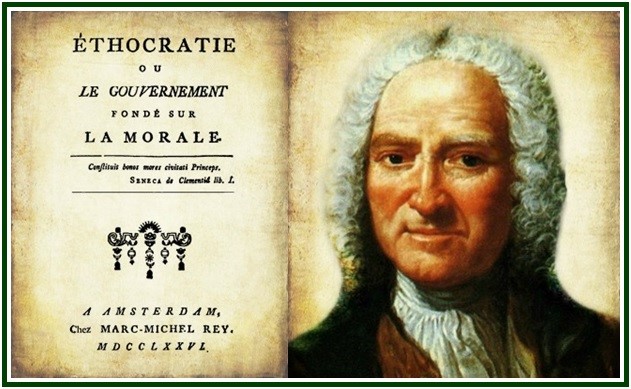
Ou le Gouvernement Fondé sur la Morale
Baron Holbach

Holbach and the front page of his book
A 2018 Editorial Note
We present in PDF the original 1776 edition of the book “Éthocratie”, by Paul-Henri Thiry, the Baron Holbach, or d’Holbach.
The work is among the most significant in the French Enlightenment of the 18th century. Its value is permanent. However, the practical importance of the book as a philosophical view of social relations and collective karma is yet to be recognized, which should take place in due time.
In “The Mahatma Letters” – or “Lettres des Mahatmas”- a Master of the Wisdom writes:
“Fait assez étrange, j’ai trouvez un auteur européen – le plus grand matérialiste de son temps, le baron d’Holbach – dont les idées coïncident entièrement avec celles de notre philosophie. Quand je lisais son Système de la Nature, j’aurais pu imaginer que j’avais notre livre de Kiu-te devant moi.” [1]
The secret book of Kiu-te or Kiu-ti contains the Eastern esoteric scriptures on which Helena Blavatsky’s work “The Secret Doctrine” is based.
In reading Baron Holbach in the 21st century, one must take into consideration the use of some classical terms.
Where the book “Éthocratie” refers to kings, one must read “heads of state” or “heads of government”.
Where the author mentions “subjects”, the term corresponds to “citizens”. A “prince” is a statesman.
Anonymously published in 1776 and printed in Amsterdam in order to avoid persecution, the work is dedicated to the unfortunate king Louis XVI, to whom Holbach refers in these words:
“Roi de France et de Navarre, monarque juste, humain, bienfaisant; ami de la vérité, de la vertu, de la simplicité; ennemi de la flatterie, du vice, du faste, de la tyrannie; restaurateur de l’ordre et des mœurs; père de son peuple; protecteur du pauvre; dont le règne est l’espoir des bons, l’effroi des méchants, la consolation des vrais citoyens: voué, dédié, consacré par un citoyen fidèle, zélé, respectueux, qui dit la vérité au prince qui veut l’entendre.”
There may be some irony in these words.
Louis XVI had a tragic life.
Born on 23 August 1754, he was the king of France from 1774 until he was dethroned in 1792, during the French Revolution. Condemned to death, he was assassinated in Paris on 21 January 1793.
Baron Holbach is one of the main thinkers of the Enlightenment. He was born in 1723 and died in the first semester of 1789. He did not see the French Revolution, which started in July 1789, nor the blood bath and slaughter it promoted in the name of the rights of the citizens.
In his writings Holbach does not incite to social disorder: he fights the causes of violence, instead. If Holbach had been heard, the long series of bloody revolutions since the 18 century might have been avoided.
The beneficent power of his writings remains as strong as ever.
(Carlos Cardoso Aveline)
NOTE:
[1] See the first paragraph of item 5 in the letter XXIII-B, p. 179, in “Lettres des Mahatmas”, transcrites et compilées par A. T. Barker, Traduit de l’anglais, Ed. Adyar, Paris, 1990, 613 pp. In the English edition of “The Mahatma Letters”, see p. 155: “Strangely enough I found a European author – the greatest materialist of his times, Baron d’Holbach – whose views coincide entirely with the views of our philosophy. When reading his Essais sur la Nature, I might have imagined I had our book of Kiu-ti before me.” Click to see the 1926 edition of the Mahatma Letters. (CCA)
000
The book “Éthocratie” was published in our websites on 06 July 2018.
000